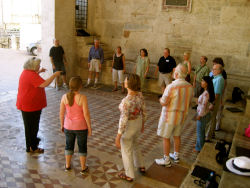 |
 |
Advertise | Sustaining Membership | VAN Store | Feedback
by Charles Lee Harp, Jr. for Vocal Area Network
Posted October 14, 2007
 As
a seasoned baritone in Singing City, one of Philadelphia's premiere choruses, I
have been seated throughout my tenure deep in the security of a very solid
baritone and bass section, with a voice that I thought had no further potential.
Therefore I was intrigued by the opportunity to improve my singing by
auditioning for a spot in the Umbrian Serenades select chamber choir to sing in
their annual summer program in Spoleto, Italy.
As
a seasoned baritone in Singing City, one of Philadelphia's premiere choruses, I
have been seated throughout my tenure deep in the security of a very solid
baritone and bass section, with a voice that I thought had no further potential.
Therefore I was intrigued by the opportunity to improve my singing by
auditioning for a spot in the Umbrian Serenades select chamber choir to sing in
their annual summer program in Spoleto, Italy.
Let's face it. I was also enticed by other blandishments Umbrian Serenades offered--12 days in an enchanting medieval hill town, wine tasting, cheese tasting, meals in restaurants well known to the Umbrian Serenades founders, and deep immersion into the culture of that unique region in the heart of Italy.
Happily, I passed the audition and persuaded my wife to join me. She was a little hesitant, wondering what she would do when I was in ensemble rehearsals in the morning, or participating in afternoon classes, including Vocal Awareness, Sight-singing and other choral "tastings" that were mentioned on the website. We needn't have worried. She attended nearly every one of those sessions. Having once sung in the Duke University Glee Club, she was fascinated by the way Holly Phares and Paulo Faustini, founders of the Umbrian Serenades program, created a beautifully cohesive intimate chamber choir out of a bunch of strangers from all across the country.
Holly and Paulo had an overriding theme. As Paulo described it, "There are three ways in which the choral singer can experience the music: In front of the music -- where it's "all about me"; behind the music -- where you just "phone it in"; or IN the music, where one accepts the active role of creating it." Of course the latter is what they stressed.
I was one of a few baritones. I had never sung in a setting where I was so exposed. Frankly, it was a little scary. But, as rehearsals and master classes progressed (in one of which I had a major personal "breakthrough" into a whole new level of singing), and as we got to know each other and truly listen to one another, we became less self-conscious and fully absorbed in and by the music. Furthermore, the repertoire was so varied, and the coaching and rehearsals were so much fun, and so thoroughly inspiring and confidence building, that as the day neared for our first public performance, I felt like a star baseball player looking forward to Opening Day. And, as a group, we had become perfectly comfortable and confident, and absolutely delighted by our combined effort, which we were able to fully appreciate in the marvelous acoustics of every venue in which we rehearsed or sang.
But as fabulous as it was to sing in places like the Duomo cathedral in Spoleto, or the Basilica of St. Francis in Assisi, these experiences would have been less magical, had we not been so deeply immersed in the beauty, culture, food and people of Umbria. The beauty of staying in one small city for 12 days is that you gradually become one of its citizens. You find a favorite coffee shop, and when you come in for the last time, they shake your hand, tearfully. All the restaurants that Holly and Paulo introduced us to were owned by friends of theirs, many since the early 1980s when Paulo and Holly first participated in Giancarlo Menotti's Festival dei Due Mondi, as members of The Westminster Choir, the choir in residence. In each of these family-owned restaurants, you became an enthusiastically welcomed patron. Marco, one chef-owner invited me into his kitchen to show me how he made his spun sugar "bird's nests" that graced his to-die-for desserts.
The other "immersions" careen through my memory like pieces of multi-colored glass in a turning kaleidoscope: a three-hour visit to an olive oil producer, followed by lunch hosted by the family owners; a bus ride up the mountain outside of Spoleto to the ancient monastery where St. Francis spent much of his time -- within its Sacred Woods -- a grove of ancient trees that, soon upon entering, you truly feel a haunting presence; standing beside a Franciscan friar in the Biblioteca of the Basilica of St. Francis, as he reverently pulls from an envelope the original of a 13th-century letter from Pope Gregory to St. Francis, instructing him to form his order of monks; being invited into the tiny organ loft of the Duomo in Spoleto by its young music director, who loved our singing so much that he invited Umbrian Serenades to return in 2008 (an invitation we received from the host of every venue); an incredibly spirited dinner al fresco at the Spoleto home of the Lorenzoni family with their best friends -- none of whom spoke English; and simply walking around the historic center of Spoleto, engaging with shopkeepers, gelato vendors, open market vendors, none of whom spoke English better than we spoke Italian, creating a level playing field of language, with much laughter on both sides.
Now I'm back with my home choir, Singing City, and this marvelous chorus has just completed rehearsals with Symphony in C (formerly the Haddonfield Symphony) for a performance of Prokofiev's monumental Alexander Nevsky. I stand at the edge of the baritone section, next to the altos. Thanks to my Umbrian Serenades experience, I have greater confidence, and to my eternal delight, a much better vocal technique, and yes, even a better feel for the essence of this epic Russian piece.
To learn more about Umbrian Serenades, please visit www.umbrianserenades.com.
Charles Lee Harp, Jr. is a baritone with Phildelphia's Singing City choir and participated in the 2007 edition of Umbrian Serenades.